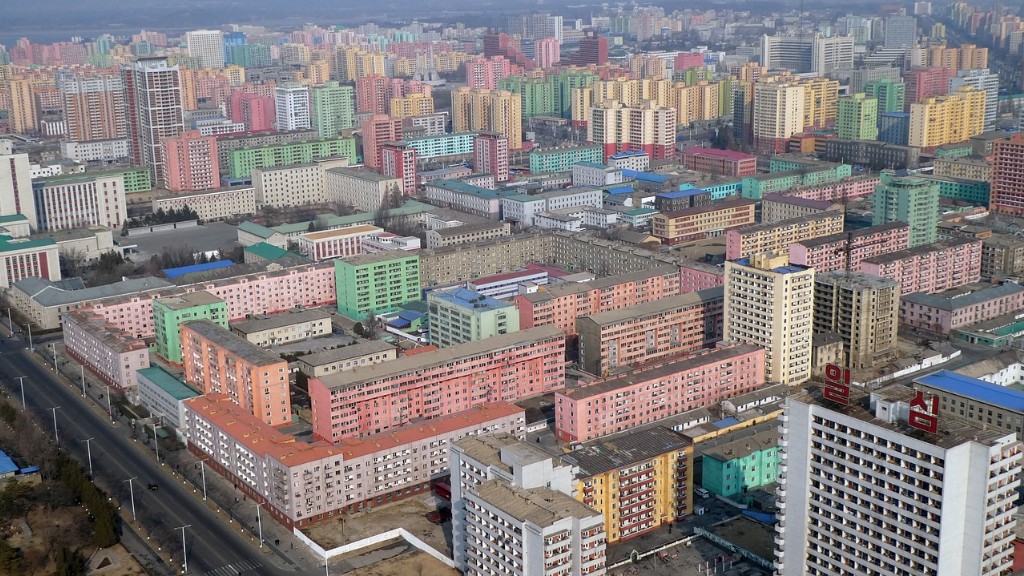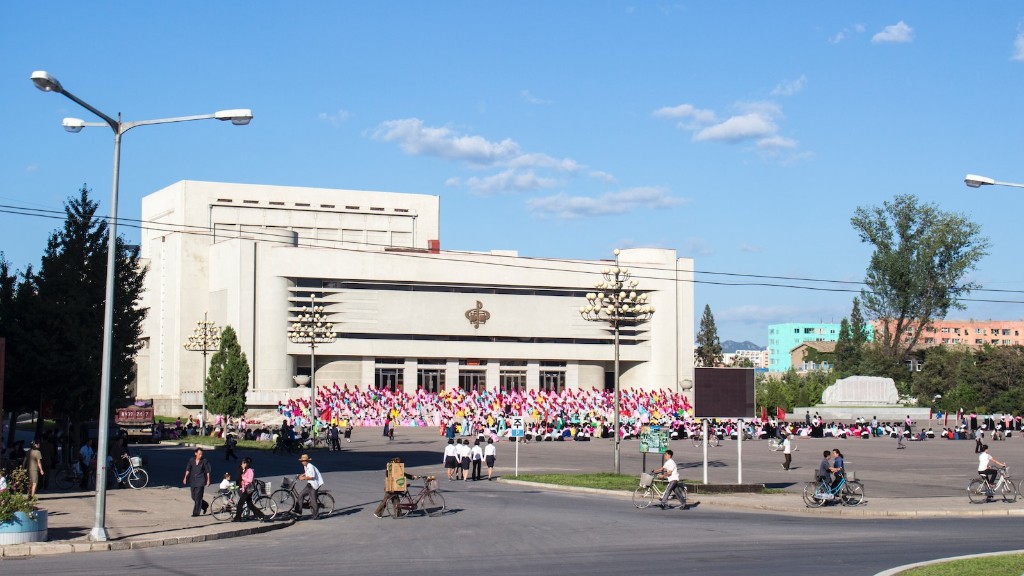North Korea is a small country in East Asia, isolated from most of the world in political and economic terms. While its primary form of deterrence is its nuclear weapons, if the country wished to, could it defeat the United States in a military conflict? This question has become more pertinent as the two countries’ relationship has deteriorated in recent years.
North Korea’s military force is largely comprised of conventional forces, unlike other states such as Russia, which have a larger deployment of nuclear weapons. It is estimated that North Korea has approximately 1.19 million active troops and over 6 million reservists. The country has be estimated to posses around 1,000 tanks, 2,450 combat aircraft, 900 helicopters and 150 coastal patrol craft. However, its arsenal of artillery and missiles is particularly potent, with over 13,000 short range rockets and an estimated 2,500 pieces of long-range missile technology.
The U.S. military is also has an overwhelming numerical advantage over North Korea. This extends to their air force, with their predominately fourth-generation fighter jets (such as the F-15s and F-16s) being a generation ahead of those possessed by North Korea (Mig-29s, Su-25s) in terms of capabilities. In addition, the U.S. has around 270 combat aircraft in South Korea compared to North Korea’s estimated 450.
The Asia-Pacific region also lends more strength to the U.S. in terms of its ability to command a military campaign against North Korea. The U.S. military has a presence in Japan and South Korea, providing an extensive logistical base that North Korea would struggle to counter. Moreover, China and Russia are unlikely to intervene in a conflict on North Korea’s behalf; they share the same goal of denuclearization and diplomatic resolution.
Another factor to consider is North Korea’s defense industry. North Korea has sufficiently advanced technology to produce and deploy chemical, biological, nuclear and radiological weapons, making it difficult to estimate the U.S. military’s success in a full-scale invasion. Furthermore, North Korea has a vast array of easily concealed tunnel systems throughout its country, making the unlikely prospect of an effective ground attack a daunting prospect.
Therefore, a direct military confrontation between the U.S. and North Korea is unlikely and would only end in disaster for both sides. A successful U.S. invasion of North Korea would require an expensive and prolonged air, land and sea campaign to successfully penetrate the country – whereas it would only take one successful retaliatory nuclear missile for North Korea to devastate South Korea, Japan or the U.S. itself.
Capabilities of Kim Jong-un
The figurehead of North Korea is its dictator Kim Jong-un, the third leader of the country since its establishment in the 1940s. Kim’s ability to maintain his position of control is likely a result of his control of the military, his grandfather’s implementation of the juche ideal of self-reliance and his own ruthless regime. He has also been effective in the promotion of nationalist messages, which has maintained and further strengthened the Korean people’s allegiance to him and the state.
Kim’s ability to lead and control vast areas of the country indicates a high degree of strategic and tactical understanding. This has been particularly evident in the way Kim has been able to play off greater powers like the US, China, and Russia to maintain North Korea’s position as a regional power. His willingness to engage in nuclear negotiations demonstrates a strategic and calculated approach to international relations.
The effectiveness of Kim’s rule over North Korea is likely to have a direct correlation to the nation’s ability to defend itself in the event of a war with the US. With his control over the military and the nuclear weapons at his disposal, the US would be wise to consider their potential limitations in the event of a conflict.
US Military and Economic Capabilities
The US has both the economic and military power to challenge North Korea in any potential conflict which gives it significant deterrence over the smaller regime. In terms of economics, the US is the largest economic power in the world, with a GDP of $21 trillion in 2018. This is in stark contrast to North Korea’s GDP of $17.4 billion.
The US also has the most powerful military force in the world by far. It has the largest number of fighter jets and warships, the world’s most advanced missile defense system, and an overwhelming number of aircraft, tanks, and personnel.
On the other hand, North Korea’s military capabilities are limited in comparison. The country has an estimated 1.2 million active troops, 6 million reservists, 1,000 tanks, 2,450 combat aircraft and 900 helicopters. However, while these numbers are significant, they are dwarfed by the US in terms of technology and capabilities.
The Role of China and Russia
It is unlikely that either China or Russia would come to North Korea’s aid in the event of a full-scale conflict with the US. China and Russia have both taken a more diplomatic approach to solving the Korean crisis and there is little incentive for either country to assist in a military conflict.
Instead, both China and Russia have been working to encourage North Korea’s denuclearization and have consistently called for dialogue between the US and North Korea to avoid military confrontation. This is likely to be the more effective and advantageous approach since it allows both countries to pursue their own interests while avoiding an unnecessary war.
Furthermore, China and Russia’s refusal to assist North Korea militarily could work to diminish North Korea’s power and influence in the region. This would be a blow to the regime, as it would weaken their grip over the Korean peninsula, limiting their ability to defend themselves against the US.
Risk of Nuclear War
The risk of nuclear war between the US and North Korea has always been a reality; the two countries have had numerous confrontations over the years and are capable of mutually assured destruction if faced with a military conflict. This is a fear which has hung over East Asia for decades, and one which both countries will strive to avoid.
A potential US-North Korea conflict could also see other countries such as Japan and South Korea dragged into the fighting, significantly increasing the destruction and destruction. For example, South Korea could be faced with a deluge of artillery and missile fire as North Korea tried to hold back US forces.
It is therefore clear that the US should avoid any form of military engagement with North Korea; not only could it be potentially disastrous, but it would also pose unacceptable levels of risk to both countries.
Hypothetical Victories
In a hypothetical confrontation between North Korea and the US, it is difficult to make any definite judgements about either countries victories. North Korea’s military power and capability to develop nuclear and radiological weapons gives it a distinct advantage in this regard and makes an all-out conflict highly unlikely.
Nevertheless, the US could potentially be victorious in certain scenarios. For example, if a US-led diplomatic solution was successfully implemented, it could lead to the denuclearization of North Korea and the establishment of a more conflict-free environment.
However, North Korea will likely remain a regional power with its potent military forces and formidable strategic capabilities. A long-term solution to the Korean crisis is still elusive, and a successful US victory may still not be achievable.
The Possible Consequences of War
The consequences of a war between the US and North Korea would be devastating for both countries and the region as a whole. In a worst-case scenario, millions of people could die as a result of nuclear and conventional weapons. In addition, the economic and political cost for the US could be huge, and North Korea could face a long period of turmoil and suffering.
Moreover, any long-term aftermath would be extremely difficult to manage. North Korea would likely be destabilized and its authoritarian rule could easily lead to a resistant and violent population. Rebuilding the country after the conflict would be a monumental task, and could potentially make the conflict worse in the long-term.
In short, a US-North Korea war would bring immense destruction and suffering to both sides and have dire long-term consequences. Therefore, it is in both countries’ best interests to avoid any form of military confrontation.





